Revant Kumari stopped the marriage of her 9-year-old daughter

We use Google Cloud Translation Services. Google requires we provide the following disclaimer relating to use of this service:
This service may contain translations powered by Google. Google disclaims all warranties related to the translations, expressed or implied, including any warranties of accuracy, reliability, and any implied warranties of merchantability, fitness for a particular purpose, and noninfringement.

Highlights
- Meena did not know her father Tankprasad Acharya. When she went to see her father, who had just been released from prison, someone introduced her to the man who had been there the night before. I still remember my mother's happiness that day. Revanthakumari continued to walk tirelessly in the democratic movement amid social exclusion and the stress given by the state.



There are only distractions, in Meena's mind. Within the circle of memory are some parts of the life-experiences of father Tank Prasad Acharya (B.S. 1969-2049) and mother Revantakumari (1973-2059). His experiences are disturbing to him. The strange picture of the history of the Rana period is etched in his mind like a flower.

The life of the father's jail and the life of the mother Revanth Kumari after the sequestration sounds like a disjointed tune played by a sad flute player - economist Meena Acharya (87).
Meena says, 'How much damage did my mother suffer in those dark days?' The father's colorful head was twisted and the tip cut off! Her father Tankprasad's story narrated by her mother Revantakumari reminds her of that day, the reflection of which still lingers in Meena's mind. ``Well, why, that image of my father never left me,'' says Meena.
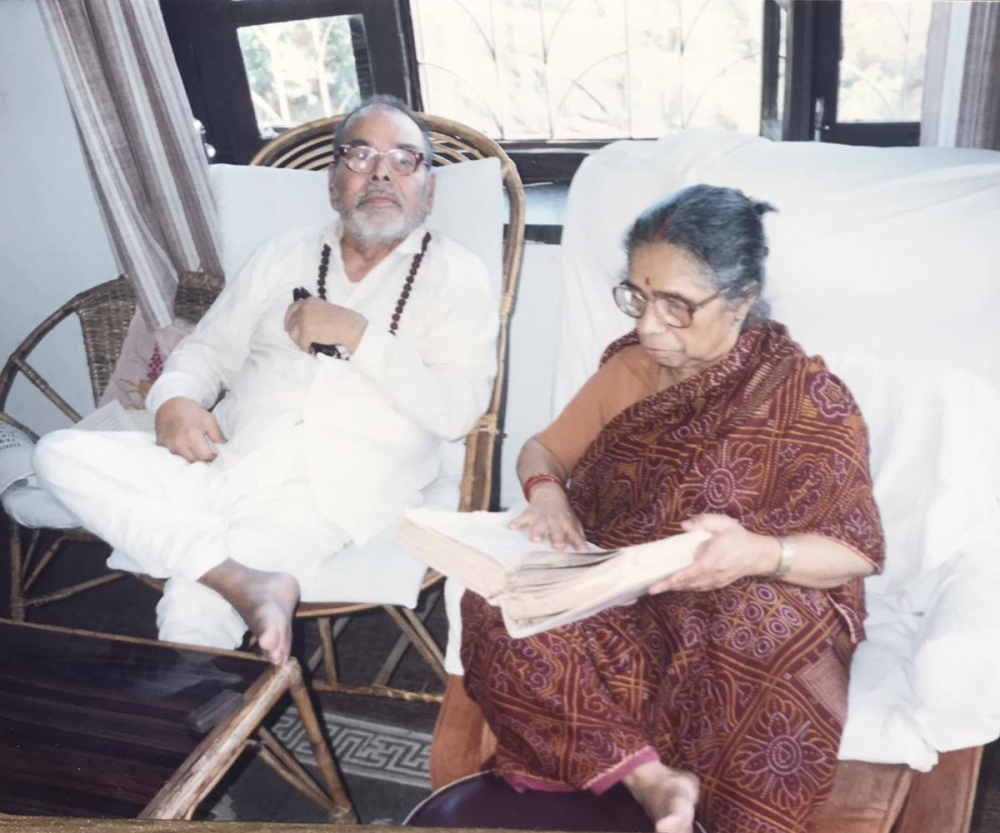 Tank Prasad Acharya and wife Revantakumari .
Tank Prasad Acharya and wife Revantakumari .
Along with Gangalal Shrestha, Dashrath Chand, Dharmabhakta Mathema and Shukraraj Shastri, the death penalty was awarded to Tank Prasad Acharya and Ramhari Sharma. Tankprasad founded the Nepal Praja Parishad Party in 1993. Tank Prasad was among the 200 people who were arrested in 1997 after spreading leaflets against Rana. The leaflets that were spread on the night of Votojatra were written - End of royal rule, establishment of democracy under the constitutional leadership of Shri 5...!
The Ranas had killed four people by hanging and shooting. However, they were not able to implement the death sentence given to Tank Prasad and Ramhari. Brahmin-killing was considered a terrible sin at that time, so it was written in the civil law that the severest punishment was to banish them from the country. The method of castration was like this - at first his head was twisted into four parts, the tip was shaved and four different colors were painted on the four parts. Then the 'holy' strings of the arms were taken off.
James F. Tank Prasad Acharya's statement in the book 'Jeunda Sahidharu' written by Fiser and translated by Arvind Rimal is- 'They tried to carry the pig away, but for some reason they did not allow him to do so. We were marched back to the jail from Singha Darbar, with our nails and hands playing the chant. Unfortunately, the Ranas did not even punish Deshnikala. Instead they put us in jail. The Ranas expropriated not only private property, but also parts of it. It also included my Sifal house and the land it covered. We spent 10 years in prison with iron nails tied to our legs.'
10 years after the Tank Prasads were jailed, the Rana rule ended. And, on January 7, 2007, the prisoners were released from the prison. After 5 years of absence, the then King Mahendra made Tankprasad the Prime Minister (from 13th January 2012 to 31st June 2014).
***
The witness of Tank Prasad's fierce struggle and dark days is Meena's mother Revant Kumari. Revant Kumari got married to Tank Prasad when she was 11 years old, when Tank Prasad was 14 years old.
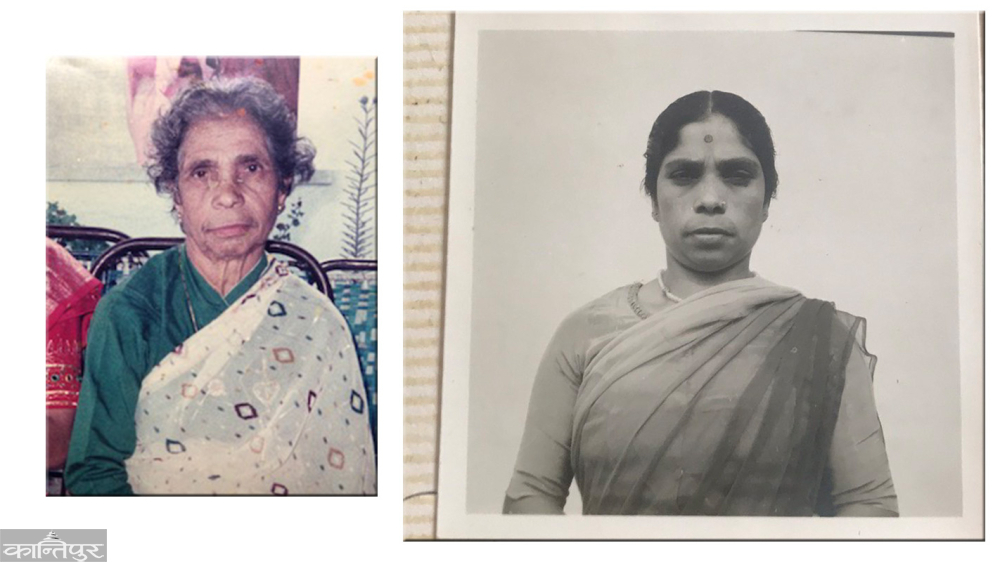 Meena Acharya's mother Revantakumari .
Meena Acharya's mother Revantakumari .
When her husband went to jail, Revant Kumari's two daughters, Meena and Shanta, were breastfeeding. Sometimes she wanders home with her little daughters. At that time, he did not get the support of his relatives. Instead, people distanced themselves, but she continued to fight for her husband's 'democratic dream'. Sahana Pradhan has written in the book "Revanth Kumari: Introduction and Expression", "She used to do party work, mait-maval with a child on her back. No one respected him in the society. Because Rana worked against the government, people were afraid to call him a dangerous person.'
In this way, her husband always had an unmatched support in politics - Revant Kumari. Tank Prasad used to say, "Rewant Kumari has suffered more than me."
'After my father went to jail, the responsibility fell on my mother's shoulders', Meena enters Smriti's alley, 'Where we are now, it is my mother's contribution. After the arrest of the father, the relatives and neighbors did not even allow the mother to enter the house.'
***
Exchange of letters with her husband Tank Prasad, satsang with leaders was making her mature. She also started participating in the movement. Revant Kumari believed that women should be freed from polygamy and child marriage. It was during the Rana period, when it was said that 'a daughter should be married before her period, then she will get merit'. Meena was nine years old, Tankprasad was worried about his daughter's marriage.
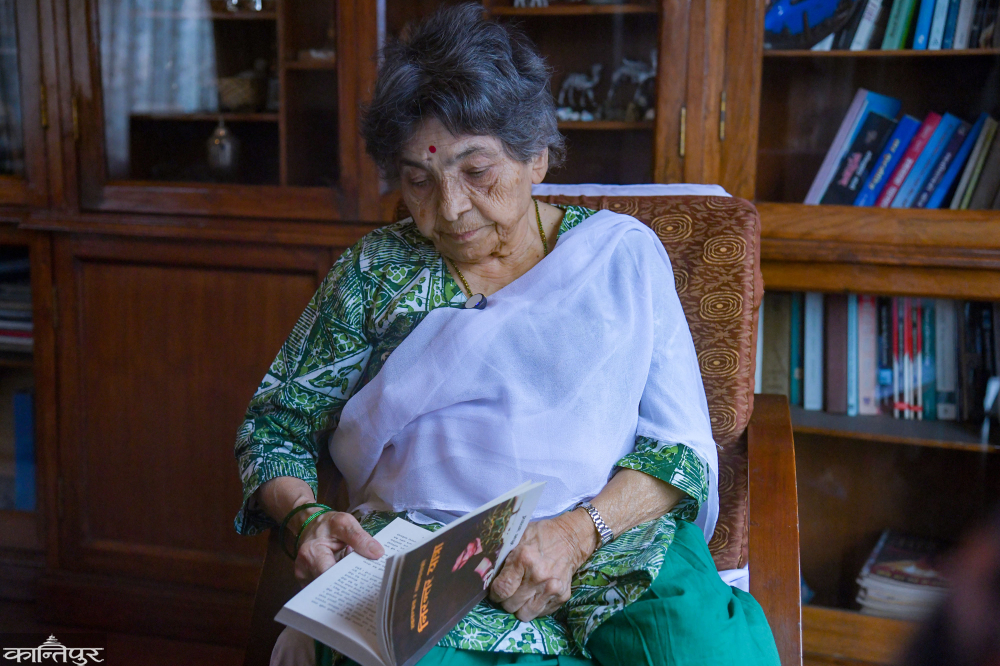 Economist Meena Acharya . Photo: Deepak KC/Kantipur
Economist Meena Acharya . Photo: Deepak KC/Kantipur
Tank Prasad sent a letter to Revant Kumari from jail - 'Now my daughter is 9 years old. She should get married without menstruation. Looking for a boy. Revantakumari, who was angry after reading the letter, sent a stern reply to Tank Prasad, "Will they get married so soon? The daughter is a child. No, times have changed. Daughters should be taught. There is no point in getting married so soon.' Meena says, 'My mother was very progressive.' She says, 'I was fearless from a young age.' Meena's circle of friends was nomadic even at that time, when daughters had to hang around in the square or in the hearth. Circling around Kathmandu on that bicycle Used to use
. At that time, it was considered a big event for a daughter to ride a bicycle. Seeing us, people used to stick out their long tongues to say 'Aho'," says Meena, "We used to cycle from Dillibazar-Narayanhiti-North Gate to Paknazol. Tole boys used to look at us and dare to say dirty words from their mouths. Meena was left free to roam like that - mother Revantakumari.
Economist Meena has spent her exciting years researching Nepal's economy, gender relations, labor market, poverty and planning. 25 years at Nepal Rastra Bank, then became a consultant at World Bank, UNDP, Asian Development Bank. He has published more than a dozen research books. Meena's mother Revant Kumari, who has recently written her autobiography 'Freedom and Equality's continuous journey', is reciting the poet Shiromani Lekhnath Paudyal's poem 'He who falls under the burden of fate/He suffers/Who gets to eat cow's milk in his mouth'- seems to be giving a daughterly reply. She says, 'Mother! These lines that you are reading have helped me to deal with the ups and downs of life easily forever.' Meena has written in her autobiography, 'How far have I been able to fulfill my hopes and aspirations from my own life? I want to account for that.'
Mother's memory in old Baneshwar, Kathmandu residence - Meena is on a walk around the world. Meena's memories are not over even after writing a whole book covering her father's struggle for democracy, her mother's life full of sad complications, her ups and downs journey, the old memories with her mother are being born as new springs of spring. It seems that she is engrossed in the wave-dance of mother-remembering, brushing away the wrinkles on her face, leaning towards the dim glass of the window on a rainy June day. Meena thinks life is a school. She says, 'Life is about learning with an open mind. Life is part of learning and living. I learned that from my mother.'
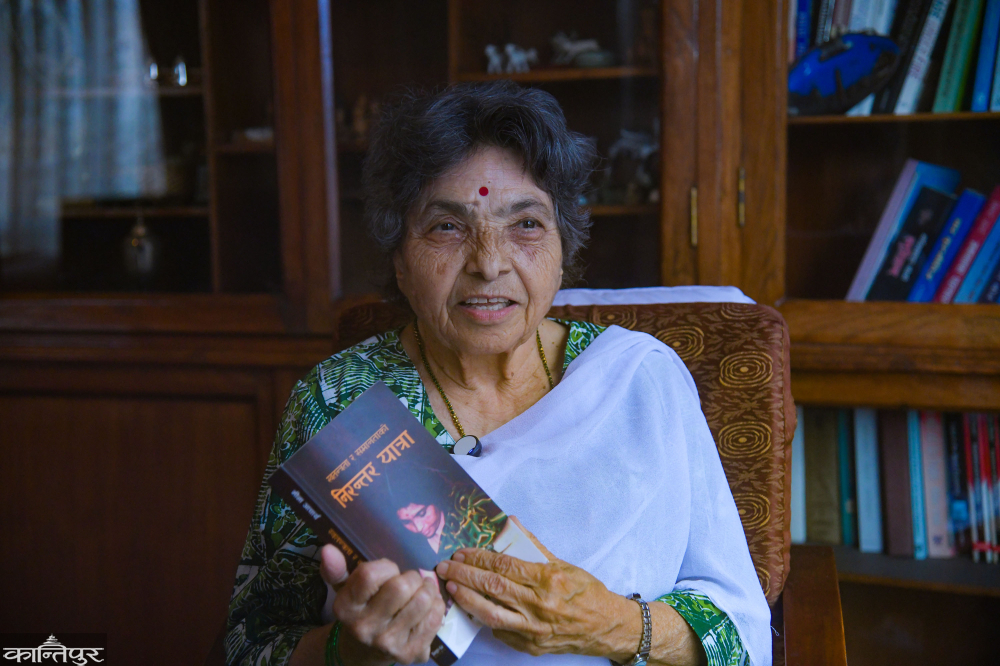 Meena was born in Dhobikhola, Kathmandu in 1994. Meena was only 3 years old when her father Tank Prasad was jailed, sister Shanta was 6 months old. The house where he was born, clothes and utensils were confiscated by the Ranas. After the house in Kathmandu was taken away, Revant Kumari sent Meena to her grandfather Tika Prasad Acharya who lived in Janakpur. The grandfather was aghast at 'his son's involvement in politics'. At Piraipir, he sold his land at Sirsia near Janakpur and left for Benares, India, taking his granddaughter Meena with him. Meena stayed with her grandfather in Banaras for 3 years. Grandpa used to say - my son went to jail, now you are my son. They used to dress him in clothes worn by boys. Again Meena returned to Sirsia from Banaras with her grandfather. And, she started studying - in a dusty school in the village.
Meena was born in Dhobikhola, Kathmandu in 1994. Meena was only 3 years old when her father Tank Prasad was jailed, sister Shanta was 6 months old. The house where he was born, clothes and utensils were confiscated by the Ranas. After the house in Kathmandu was taken away, Revant Kumari sent Meena to her grandfather Tika Prasad Acharya who lived in Janakpur. The grandfather was aghast at 'his son's involvement in politics'. At Piraipir, he sold his land at Sirsia near Janakpur and left for Benares, India, taking his granddaughter Meena with him. Meena stayed with her grandfather in Banaras for 3 years. Grandpa used to say - my son went to jail, now you are my son. They used to dress him in clothes worn by boys. Again Meena returned to Sirsia from Banaras with her grandfather. And, she started studying - in a dusty school in the village.
In 2004, Meena came back to Kathmandu following her mother. And, she started studying - in the basic school of Gaushala. After her father was jailed, Meena broke down and cried saying 'I will go with my father'. Once his mother took him to Golghar, to deliver food to Tankprasad. However, the prison staff did not allow the father to meet the daughter. Meena kept on crying, but she could not see her father. "After that, my mother carried me on her shoulder and showed me to Golghar and said - Look, he lives in that house - your father." Meena did not know her father. Meena, who was holding her mother's hand and went to see her father, was recognized by someone from afar as Abir said, 'He is your father.' Meena still remembers her mother's happiness that day. Meena feels that mother has an important contribution in our upbringing, and father is also involved in politics. Revantakumari continued to march tirelessly in the democratic movement of Nepal amid social exclusion and the stress given by the state.
Born in Thamel, Revantakumari (before the current Kathmandu 'guest house'). Even at that time she got the chance to study. Revantakumari's grandfather was a priest in the house of a Rana, her great uncle, who was studying IA in India, died at the age of 28, of tuberculosis. Grandfather used to say, "He didn't die of TB, he died of reading English." After that, no one in the house could read English. Revantakumari's grandmother did not like her granddaughters to read. But, grandfather used to say - granddaughters should read, they should know basic accounting - even to run the house. It was the grandfather who taught Revanthakumari – general mathematics. He identified - A, B, C and 'Mahabharata'. Revantakumari used to tell Meena - you have to study, you have to study anyway. "After my father was jailed, mother would teach the Nepali alphabet to the children of the neighborhood even when Maiti was gone," Meena remembers those days.
Meena reminisces about those beautiful evenings. Mother used to sit in the courtyard in the evening and read the autobiographies of Gandhi and Nehru, Gorky, Shakespeare's Hindi translation stories, Mahabharata, Ramayana, Bhagwat Purana. Meena says, "Mother always used to feel sad for not knowing how to read English." I would sleep with my mother, fall asleep listening to stories. He used to say - women can do a lot, you should also study and become a big person. That's when I thought that I would do something for this country after studying.' After studying IA at Padmakanya Campus, Meena did her BA from India, Masters from the Soviet Union and her graduation from America. There was widespread pressure for marriage – from home. However, without knowing at home, she went to study in the Soviet Union (Moscow) on 3 September 1960. At that time, Revantakumari said to her husband that she should get her daughter married, "Those who want to read should be allowed to read!" It was her mother's love and support that taught Meena to spread her wings and fly. Russia was a new world, where she saw - a completely free society.
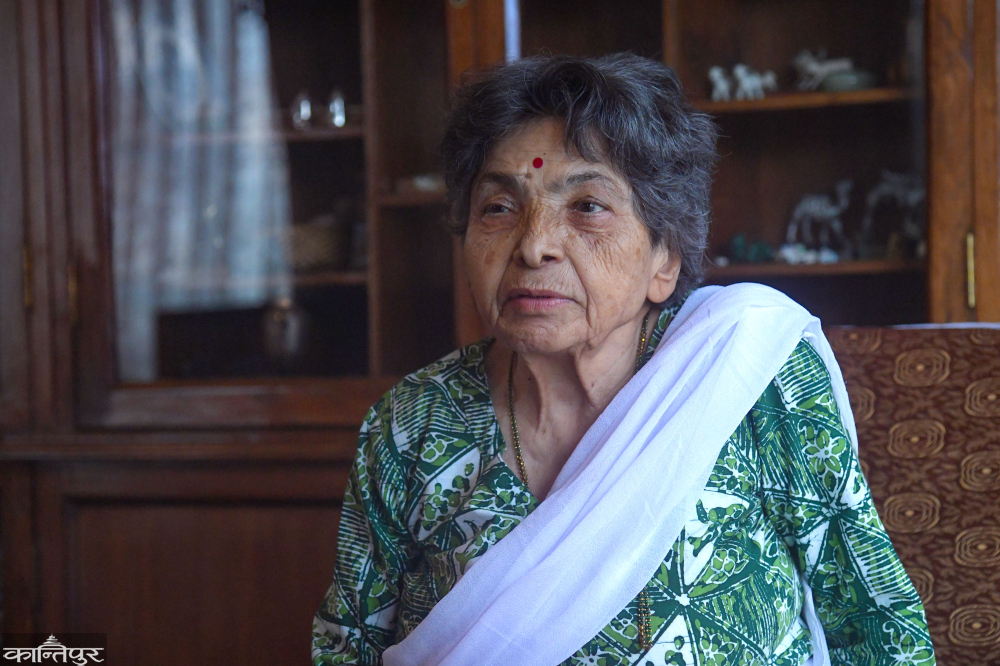 Mina got married in Moscow - to fellow student Viktor Siviakov. This incident shook Meena's family and the Nepali Embassy of Russia. The Citizenship Act of Nepal used to say that if a Nepali woman marries a foreign man, the citizenship of a Nepali woman will automatically be revoked (later the law was changed). However, neither she nor her husband was ready to give up her citizenship. Her marriage was registered in Russia only after Meena wrote a petition to the Vice President amid many difficulties.
Mina got married in Moscow - to fellow student Viktor Siviakov. This incident shook Meena's family and the Nepali Embassy of Russia. The Citizenship Act of Nepal used to say that if a Nepali woman marries a foreign man, the citizenship of a Nepali woman will automatically be revoked (later the law was changed). However, neither she nor her husband was ready to give up her citizenship. Her marriage was registered in Russia only after Meena wrote a petition to the Vice President amid many difficulties.
She was born there - Siviakov Acharya without a daughter. Meena came to Nepal with her husband Victor and daughter. Victor joined the Mahendra Highway project with the help of the Soviet Union, Meena became an official at the Rashtra Bank. Divorced after the project was over. Meena says, "Perhaps Victor has an 'identity' problem." I kept my daughter with me. Even in her marriage and divorce with Victor, her mother Revantakumari did not interfere, she wanted her daughter's life to go according to her wishes.
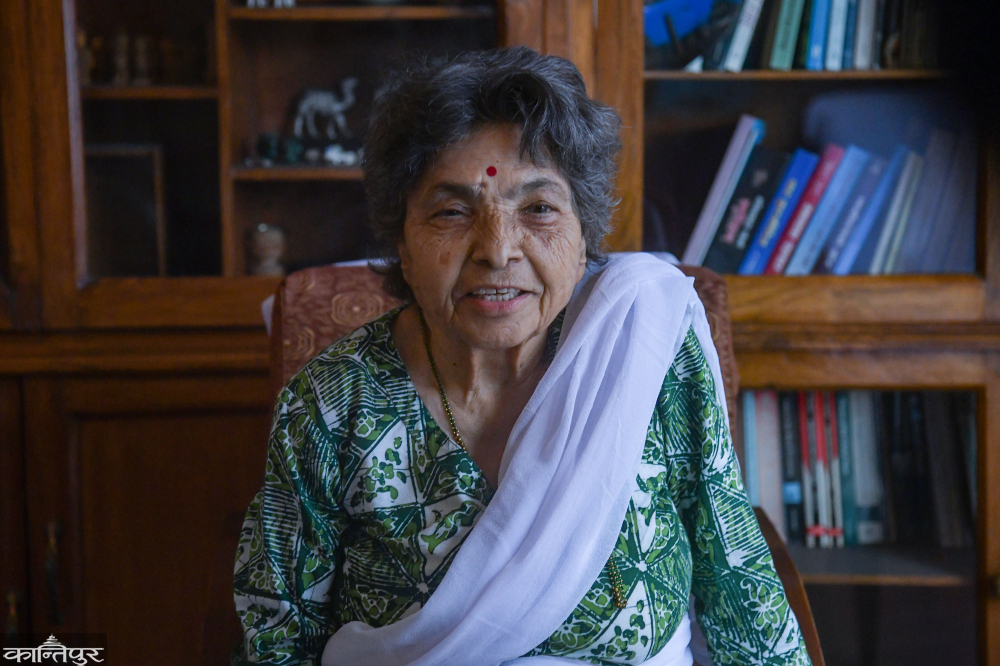 Revant Kumari's idea was that daughters should be given full rights like sons in the family property. However, it was not written in the comments sent by the party for the 046 constitution. The mother-daughter position was the same. Tank Prasad was extremely angry. There was a big fight in the house. Revantakumari's stance, 'daughters also have full rights in property', was included in the Praja Parishad's comment. Probably not written in history, but Revantakumari also has a terrible story of struggle to accelerate the democratic movement of Nepal.
Revant Kumari's idea was that daughters should be given full rights like sons in the family property. However, it was not written in the comments sent by the party for the 046 constitution. The mother-daughter position was the same. Tank Prasad was extremely angry. There was a big fight in the house. Revantakumari's stance, 'daughters also have full rights in property', was included in the Praja Parishad's comment. Probably not written in history, but Revantakumari also has a terrible story of struggle to accelerate the democratic movement of Nepal.
Meena remembers that Revantakumari walked to Raxaul in India in 2006, carrying a letter from Tank Prasad's prison. She used to deliver letters from Tank Prasad and other jail inmates to various places in India – to Jawaharlal Nehru, Jayaprakash Narayan, Mahendra, BPs – sometimes hidden in curds, sometimes in tin boxes. Ramhari Sharma, who was in jail with Tank Prasad, wrote in "Rewant Kumari: Introduction and Expression", "Rewant Kumari's sister-in-law worked courageously in the harsh political background of that time, going to Banaras and Calcutta. We survived in prison because of the courage and courage of Revantkumaris.'
***
Grandmother Revantakumari was very loving even in the eyes of her granddaughter. Bina grew up in Nepal with her grandmother. In his memory, Revantakumari had a temper that never got angry. "He used to read Gorkhapatra all day - from top to bottom," says Bina.
Revantakumari used to tell her granddaughter with a laugh, 'I was afraid when I went to deliver a letter to my husband in jail, but the police never found the letter.' Meena's memories keep repeating in her memory - the mango garden in Sirsia that her grandfather had just delivered to her, in which she used to play all day long. The daughter continues to tell Bina - how she waited for the ripe mangoes to fall from the plant!
Sirsia's memories of malati and kamini flowers lead her to the far-reaching fields of the Terai, where as a child she ate khesari and roasted chickpeas, swam in the ponds beside the fields. He had a golden childhood, wandering around the mango grove all day long, swimming, running around the pond. Now those days are a thing of the past. Nowadays Meena spends her days in the confines of a house in the city. Her ears hear less, her eyes are hard to see the scene around her. However, those rural childhood memories of Madhesh make Meena Acharya happy like a child. says,
'It seems again - back to those childhood days, but now I am old.' Tank Prasad kept asking Bina - 'Granddaughter, tell me! Am I good or is your grandmother good?' He has countless such memories. But now she feels that both her grandfather and grandmother were very good people, whom she 'misses' a lot these days. She says, 'They were - really good people.'
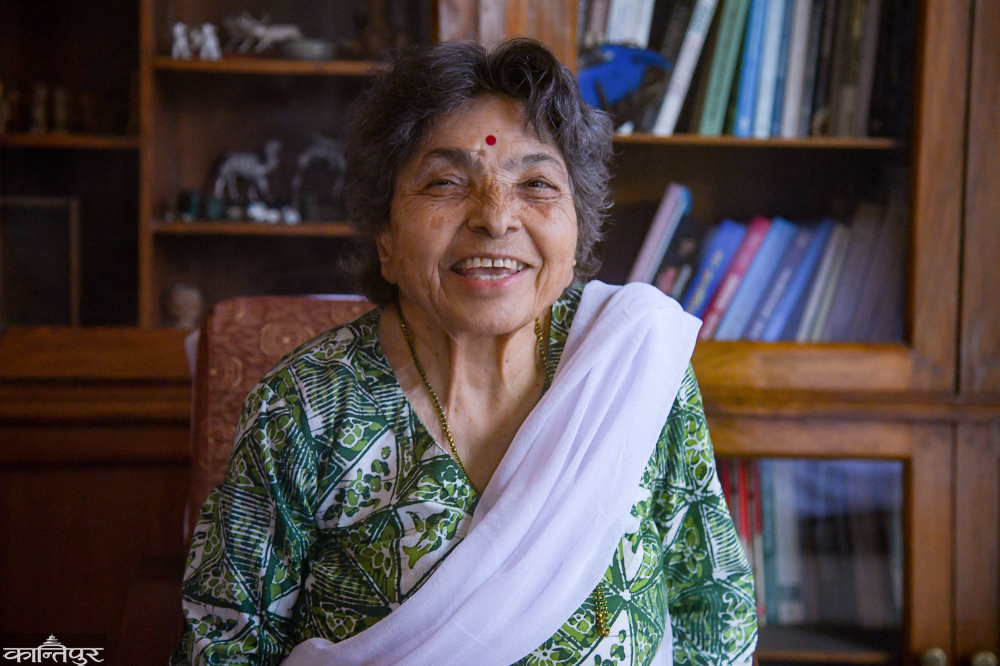
 प्रकाशित : असार २५, २०८१ १०:१९
प्रकाशित : असार २५, २०८१ १०:१९

 २२.१२°C काठमाडौं
२२.१२°C काठमाडौं











